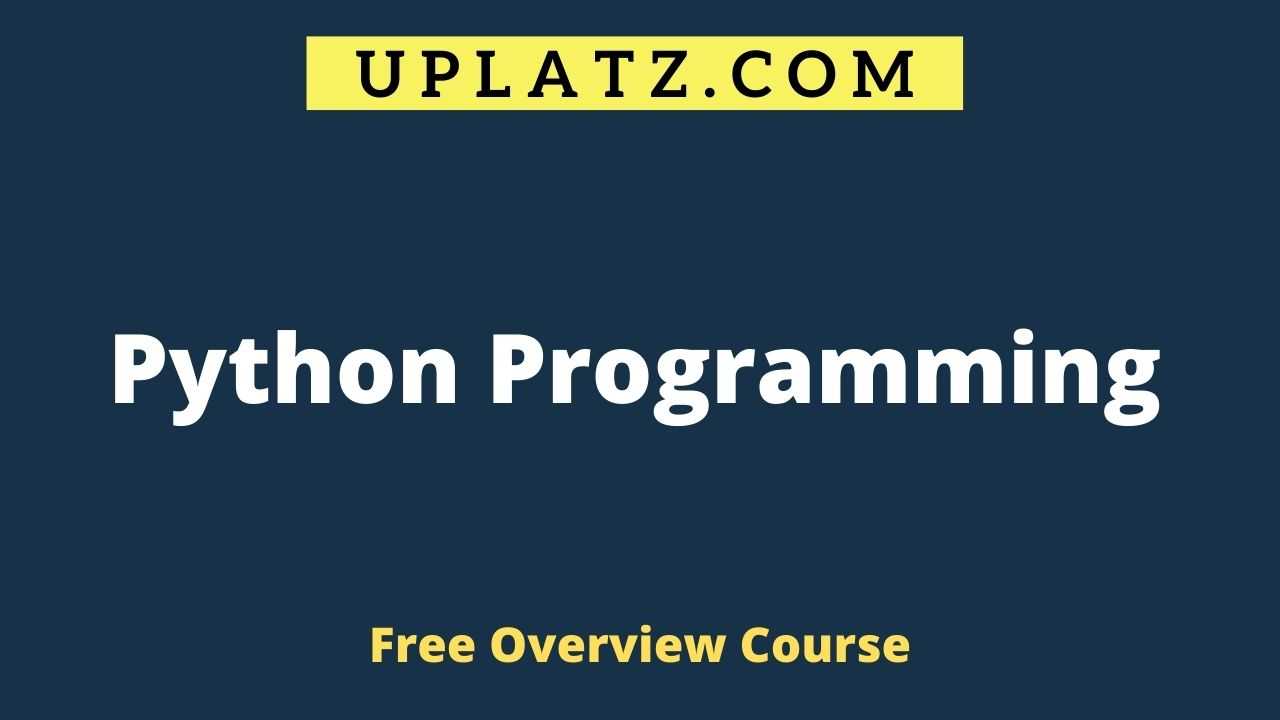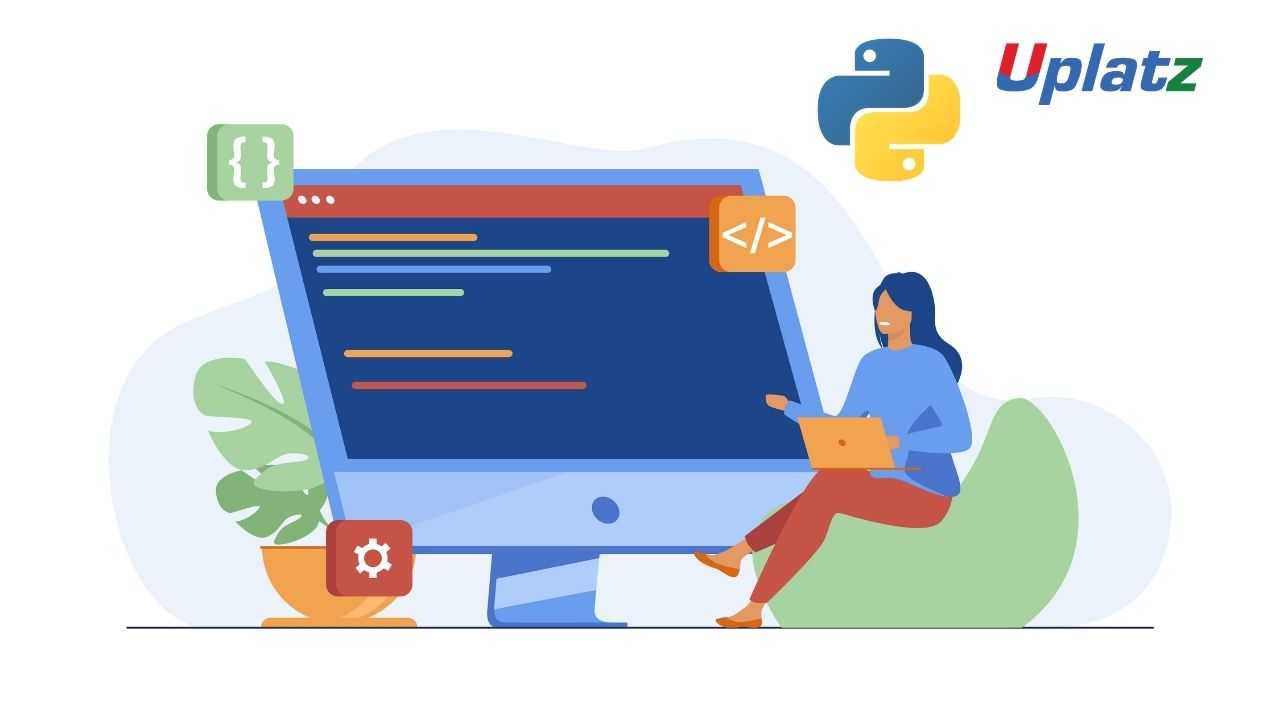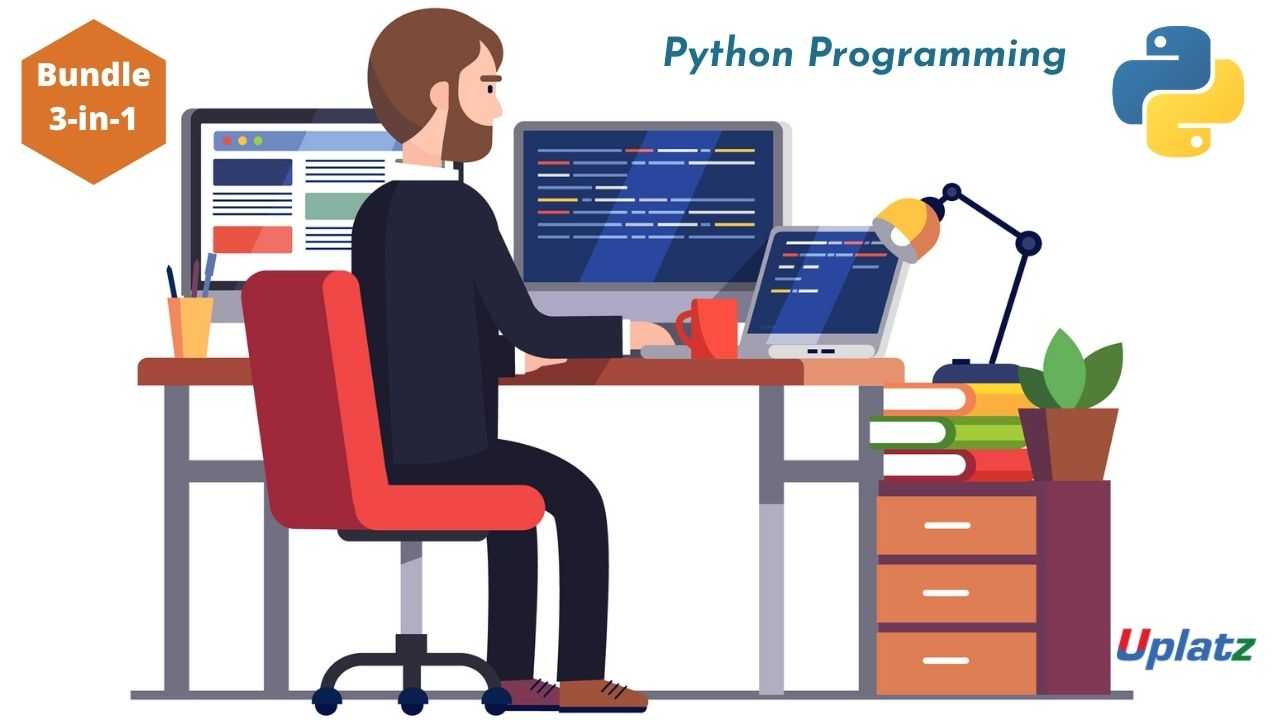Overview Course - Python Programming
Know about programming, logical code for large-scale projects using python. View Course Curriculum
Price Match Guarantee
Full Lifetime Access
Access on any Device
Technical Support
Secure Checkout
Course Completion Certificate
View Course Curriculum
Price Match Guarantee
Full Lifetime Access
Access on any Device
Technical Support
Secure Checkout
Course Completion Certificate
 65% Started a new career
Enroll Now
65% Started a new career
Enroll Now
-
 45% Got a pay increase and promotion
45% Got a pay increase and promotion
Students also bought -
-

- Numerical Computing in Python with NumPy
- 20 Hours
- GBP 12
- 786 Learners
-

- Bundle Multi (4-in-1) - Python Programming
- 120 Hours
- GBP 22
- 3779 Learners
-

- Career Path - IT Consultant
- 200 Hours
- GBP 32
- 5851 Learners

This is an overview course on Python Programming while the complete detailed-level Python Programming course is available at - https://training.uplatz.com/online-it-course.php?id=python-programming-advanced-154. Python is a general-purpose, yet a powerful programming language used for web development, in data science, for creating software prototypes and many more. It has a very simple and easy to understand syntax which the beginners can learn at ease. It allows a programmer to write fewer lines of code than most another programming languages.
Apart from web development and data science, there are other useful aspects of Python Programming Language such as (i) It can be used on the server-side to create applications (ii) it can be connected to the database systems and can also be used to read and modify files (iii) it can be used to handle large data sets and also can perform complex mathematical functions (iv) can be used for software development.
Along with being a simple programming language, Python programming has a number of advantages compared to other programming languages such as it works on different platforms like Windows, Mac, Linux, etc., it has got a simple syntax which is a big advantage in case of any entry-level programmer, it can be treated in a procedural way, object-oriented as well as of a functional way.
In this Python Programming Language course from Uplatz, students will get familiar with the basic overview of Python language, basic elements of Python like Keywords, Data Types, Identifiers etc., Operators in Python, basic programming in Python etc.
At the end of this course, students will be awarded a Course Completion Certificate on the Python Programming Language from Uplatz.
Course/Topic - Python Programming overview - all lectures
-
Class 1 - Introduction to Python
-
Class 2 - Basic Elements of Python
-
Class 3 - Installation of Python
· Master the fundamentals of writing Python scripts
· Learn core Python scripting elements such as variables and flow control structures
· Discover how to work with lists and sequence data
· Write Python functions to facilitate code reuse
· Use Python to read and write files
· Make their code robust by handling errors and exceptions properly
· Work with the Python standard library
· Explore Python's object-oriented features
· Search text using regular expressions
· Understand why Python is a useful scripting language for developers
· Learn how to design and program Python applications
· Learn how to use lists, tuples, and dictionaries in Python programs
· Learn how to identify Python object types
· Learn how to use indexing and slicing to access data in Python programs
· Define the structure and components of a Python program
· Learn how to write loops and decision statements in Python
· Learn how to write functions and pass arguments in Python
· Learn how to build and package Python modules for reusability
· Learn how to read and write files in Python
· Learn how to design object‐oriented programs with Python classes
· Learn how to use class inheritance in Python for reusability
· Learn how to use exception handling in Python applications for error handling
1. INTRODUCTION TO PYTHON: why learn python, a feature of python, the importance of learning python, application of python programming.
2. BASIC ELEMENTS OF PYTHON: keywords, data types, identifiers, operators, statements.
3. INSTALLATION OF PYTHON.
4. INPUT AND OUTPUT STATEMENTS IN PYTHON.
5. DATA TYPES IN PYTHON: int, float, strings, lists, tuples, dictionaries.
6. OPERATORS IN PYTHON: arithmetic, logical, assignment, relational, bitwise, membership operators.
7. TYPE CONVERSION IN PYTHON: implicit and explicit conversion in python.
8. BASIC PROGRAMMING IN PYTHON.
9. INTRODUCTION TO MATH MODULE IN PYTHON.
10. CONDITIONAL STATEMENTS IN PYTHON: simple if, simple if-else, multiple if-else, nested if-else.
11. LOOPING IN PYTHON: for loop, while loop in python, break and continue keywords in python, nested for loop in python.
12. FUNCTIONS IN PYTHON: declaration and definition of functions in python, passing arguments in functions, return keyword, function calling, arbitrary arguments, keywords arguments, default arguments in python.
13. STRINGS IN PYTHON: basics of strings, string functions.
14. LISTS IN PYTHON: introduction, list functions in python, list programs.
15. TUPLES IN PYTHON: basics, tuple functions.
16. SETS IN PYTHON: basics, set operations.
17. DICTIONARIES IN PYTHON: basics, functions in dictionaries, examples.
18. BUILT-IN METHODS IN PYTHON.
19. LAMBDA FUNCTIONS IN PYTHON.
20. FILE HANDLING IN PYTHON.
21. EXCEPTION HANDLING IN PYTHON.
22. PYTHON PROGRAM EXAMPLES.
23. OPERATOR PRECEDENCE IN PYTHON.
24. RECURSION IN PYTHON.
25. PROGRAMMING EXAMPLES IN PYTHON.
26. OBJECT ORIENTED PROGRAMMING IN PYTHON: class, objects, inheritance, polymorphism, terminologies, class attributes, object attributes, examples.
27. TIME MODULE IN PYTHON.
28. BOOLEAN IN PYTHON.
29. MISCELLANEOUS TOPICS.
The Python Programming Certification ensures you know planning, production and measurement techniques needed to stand out from the competition.
Python is commonly used for developing websites and software, task automation, data analysis, and data visualization. Since it's relatively easy to learn, Python has been adopted by many non-programmers such as accountants and scientists, for a variety of everyday tasks, like organizing finances.
Python is a backend programming language that's great for beginners. Python is similar in many ways to Ruby, but is less verbose than other programming languages - a little less wordy. Python is approachable. Even if you haven't taken a CS class, you can still write a useful tool in Python.
Python is widely considered one of the easiest programming languages for a beginner to learn, but it is also difficult to master. Anyone can learn Python if they work hard enough at it, but becoming a Python Developer will require a lot of practice and patience.
Open EDG Python Institute has defined an independent global certification path for the Python programming language, and has developed an international Python programming examination standard. Candidates can take certification exams at three competency levels: Entry, Associate, and Professional.
A valuable Python certificate is a powerful weapon in the race for better employment, first-rate expertise and greater competitiveness. Certification opens doors to a better job and a better salary. It is a great motivator for self-improvement and self-development.
Being a Python developer is a good career choice, mainly due to the increasing demand for Python developers in many industries. Many high profile companies such as Google and Facebook use Python, and it also has a high paying salary with an average of $120,000 USD per year.
Uplatz online training guarantees the participants to successfully go through the Python Programming Certification provided by Uplatz. Uplatz provides appropriate teaching and expertise training to equip the participants for implementing the learnt concepts in an organization.
Course Completion Certificate will be awarded by Uplatz upon successful completion of the Python Programming online course.
The Python Programming draws an average salary of $144,000 per year depending on their knowledge and hands-on experience.
Python might be enough to get a job, but most jobs require a set of skills. Specialization is necessary, but technical versatility is also important. For example, you might get a job to write Python code that connects to a MySQL database. To build a web application, you need Javascript, HTML, and CSS.
The highest number of Python programming jobs is for software engineer roles. People with this job title very often specialize in another programming language aside from Python – Java and Javascript are among the popular options. The second type of role with the most Python coding jobs is data scientist.
Python is becoming the first-choice language for learning it to get “actual jobs”. It is also being used for many purposes, from web development to mobile app development to data science.
Python Programming Language Application
Lead Python developer.
Python Programming Language Application Developer.
Software Engineering: Python Developer.
1 - What are the uses of Python language?
Ans - Python is the most powerful programming language widely used for data analysis, machine learning, data science, web applications, machine learning, artificial intelligence, and analysis science.
2 - What are the pre-requisites of learning Python language?
Ans - No pre-requisite is required. You can learn Python language from scratch even if you do not have any programming background.
3 - Who is Python programming course for?
This course is intended for programmers who need to write or maintain scripts in Python. This course is also suitable for trainee programmers who may have little, to no in-depth knowledge of programming.
4 - Why Python language is more important for IT companies?
Python is one of the most popular languages for business analytics because it is easy to use, powerful, object-oriented, open-source, and run everywhere, from Windows PC, Linux, Android, etc.
5 - Is Python an object-oriented language?
Yes, Python is an object-oriented language because it is easy to create and use classes and objects.
6 - What are the benefits of Python?
Some of the benefits of Python include:
a) Open source and community development
b) Wide support libraries
c) Learning ease and support available
d) User-friendly data structures
e) Productivity and speed









